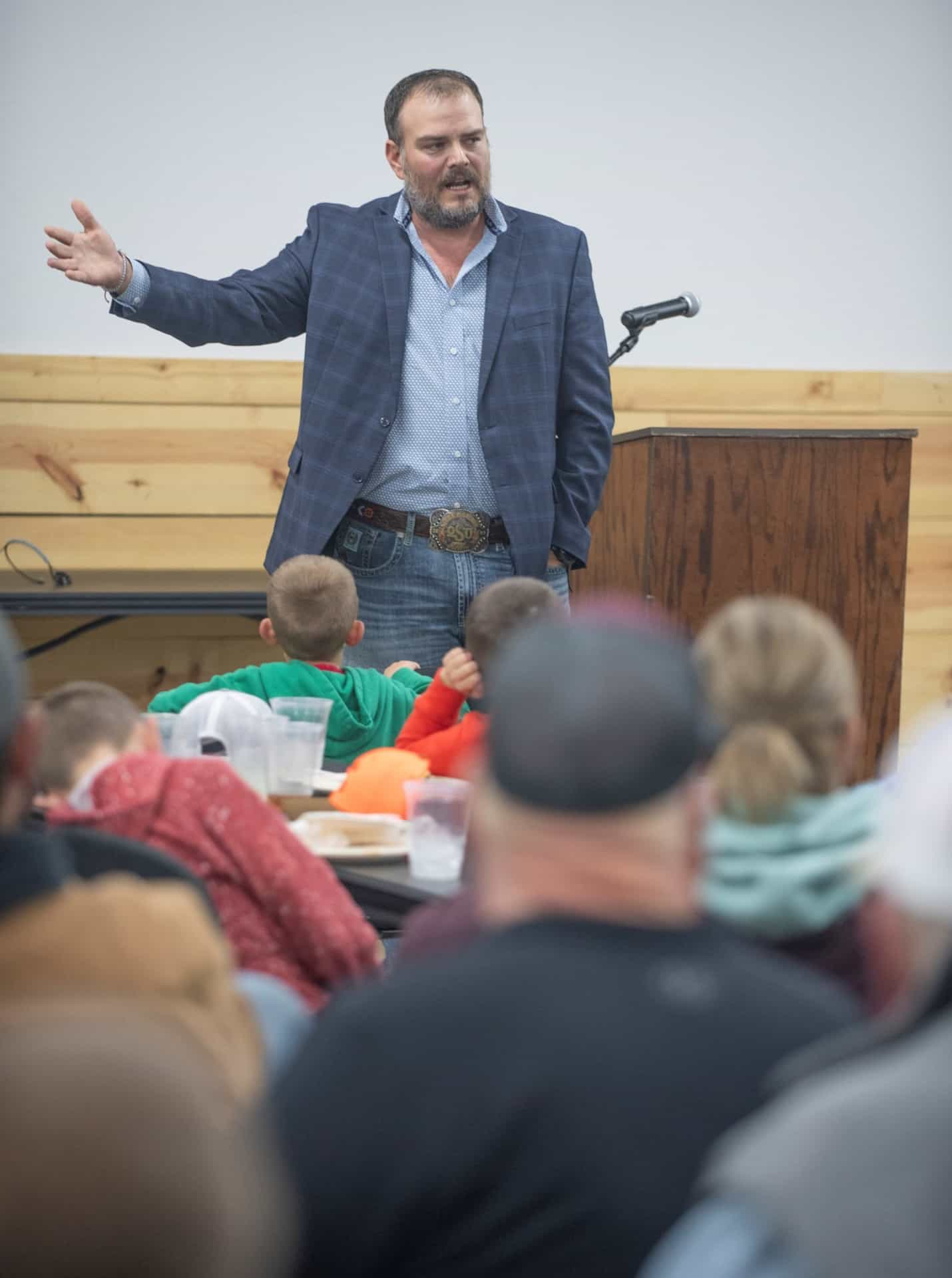Solid year behind, strategic path forward
By Allison Jenkins
Fiscal year results and future plans reported at MFA’s Regional Annual Meetings
For the second year in a row, MFA Incorporated hosted a series of regional annual meetings rather than one centralized event. From Nov. 17-20, eight meetings were held across the cooperative’s territory, bringing members together in a town-hall format for company updates, interactive dialogue and board elections.
Each meeting opened with financial, operational and strategic reports from MFA’s executive team, followed by an open question-and-answer session. After receiving positive feedback last year, leaders said the regional approach was repeated for 2025 to promote deeper engagement and more accessible conversations with members.
“Having this type of member meeting, not a large annual meeting setting, is real, and it means a lot,” said Bob Huffman, MFA Incorporated president and CEO. “Cooperatives tend to fail when they lose that governance and direct engagement, so we really appreciate that our members take time to be here.”
This year’s meetings featured a notable change: elections for the MFA Incorporated Board of Directors took place during the regional gatherings rather than at separate district delegate meetings. Members elected five directors to serve three-year terms.
Two incumbents—Frank Schieber of Stanberry, representing District 1, and Craig Lambert of Pattonsburg, representing District 4—were re-elected. Dan Armstrong of Norborne was chosen to represent District 5, succeeding Don Schlesselman, who concluded his service after reaching term limits.
 In two districts, challengers won seats. Jon Roberts of Leeton will represent District 8, replacing incumbent Dwayne Schad, and Jarrod Simpson of Salem will serve District 13 in the position formerly held by Gary McClure.
In two districts, challengers won seats. Jon Roberts of Leeton will represent District 8, replacing incumbent Dwayne Schad, and Jarrod Simpson of Salem will serve District 13 in the position formerly held by Gary McClure.
Along with the elections, a key purpose of the annual meetings was to report on the cooperative’s financial performance for the fiscal year ending Aug. 31, 2025. MFA closed the year with a profit of $6.9 million. While that outcome was positive, leaders emphasized a cautious outlook heading into fiscal 2026 as producers contend with tight margins and volatile market conditions.
“Looking ahead to the challenges that we will be facing, both as producers and your ag retailer, we were very conservative in our approach,” said Chief Financial Officer Karen White. “Our strategy to improve profitability will be based on improving market share and keeping our expenses in check.”
As White reviewed financial details, she noted that overall sales dollars declined across all categories but emphasized that topline sales are not always a full measure of performance for a commodity-driven business.
“Last year, we had wins and challenges, and overall, we did have a decrease in operating margin from plan,” White explained “A good portion of that was offset by a 5% decrease in operating expenses. That means our team did a great job of managing expenses in a very tough and inflationary environment.”
White also reported that MFA’s total assets are $562 million, net worth stands at $203 million, and working capital is $87 million, which she described as “a strong level taking us into fiscal 2026.”
With the challenging economic outlook for 2026, White said management and the board opted to retain current year earnings for reinvestment, foregoing equity retirements to strengthen long-term value for producers. However, MFA’s board approved allocating $20 million in Qualified Business Income deductions to grain members. This provision, a modified version of what is still often referred to as the Domestic Production Activities Deduction (DPAD), was made permanent by the “One Big Beautiful Bill Act” signed into law this past July. The tax benefit is unique to cooperatives and passes along significant savings to patrons based on grain delivered.
MFA’s fiscal 2026 budget projects a pre-tax profit of $9 million, working capital of $93.1 million and capital expenditures of $14.5 million. White said those investments will focus on application equipment, rolling stock and fertilizer infrastructure to support efficiency and service improvements.
“We are committed to navigating the challenges ahead and investing in a stronger future for all of us,” White concluded. “We can’t predict those challenges, but we can manage through them.”
In operational highlights, Executive Vice President Jason Weirich emphasized that MFA is taking a forward-looking approach with significant changes and investments planned over the next five years. In 2025, that strategy included facility improvements, closures and divestures.
Weirich also outlined key performance areas for 2025, including:
- Grain: 99 million bushels moved—a record for MFA.
- Fertilizer: Volume totaled 744,000 tons, below the 878,000-ton plan due largely to unfavorable spring weather and lower farm profitability.
- Crop Protection: Sales reached $210 million versus a planned $253 million as growers opted for lower-cost inputs.
- Seed: Sales fell about $8 million short of budget.
- Feed: Volume rose to 272,000 tons, surpassing the 260,000-ton plan, with notable gains in beef and poultry feeds.
 As for future plans, Weirich said additional investments will be made in fertilizer plants, feed mills, application equipment and supply chain systems to boost efficiency and stewardship, prioritizing projects with strong returns and member impact.
As for future plans, Weirich said additional investments will be made in fertilizer plants, feed mills, application equipment and supply chain systems to boost efficiency and stewardship, prioritizing projects with strong returns and member impact.
“Your board is fully aware of where we’re going in the next five years,” he said. “They’ve seen the plans of how we want to invest in operations and our people, and I would tell you that the road map looks very good going forward.”
In his first annual meetings as CEO, Huffman echoed the commitment to MFA’s member-owners and its mission of providing them with value-added products, services and expertise.
“My first few months have really been focused on learning who MFA is—not making any assumptions, but really understanding how we work, how our producers operate, what's needed, and areas that I can support,” Huffman said. “This team is a machine, and the talent is unbelievable. My role is to drive and support getting where we need to go as quickly as we can. And the whole reason for that is bringing that value to you as producers, as members, as owners of this cooperative.”
Acknowledging the anticipated challenges at the farm gate during MFA’s 2026 fiscal year, Huffman reiterated the cooperative’s focus on financial discipline, operational excellence, improved efficiency and competitive service across its territory.
“I know times are tough. The stress level that I see in producers is no different than the stress level I see in our employees. They share that burden,” Huffman said. “Everybody has the same goals, and everybody realizes that, at the end of the day, we’re a farmer-owned co-op. We know the headwinds are there, but if we work together, that’s the best way to get through it.”